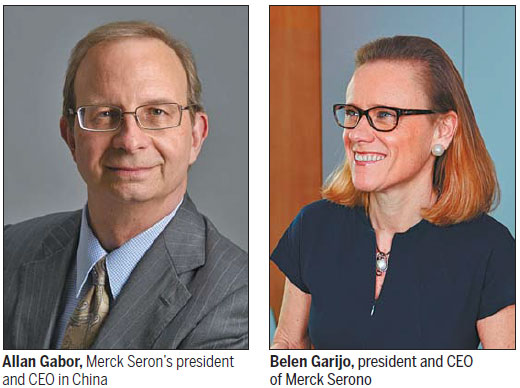Meeting essential needs
Updated: 2014-11-28 08:28
By Wang Chao and Zhong Nan(China Daily Europe)
|
|||||||||||
There is a stereotype in many Chinese patients' minds: European medicine is quite effective, but it is expensive and not covered by basic health insurance. That may soon change, as European brands make it onto the Chinese government's essential drugs list.
Essential drugs, or basic medicines, refers to a variety of medicines that are covered by the urban employee medical insurance in China. If the medicine is not on the list, patients have to pay out of their own pocket.
Merck Serono, a pharmaceutical company headquartered in Darmstadt, Germany, is actively involved in China's ongoing healthcare reforms, during which the essential drugs list is being revised.

Established in Darmstadt in 1668, Merck operates in 66 countries with 38,000 employees. Merck Serono is its bio-pharmaceutical division and specializes in treating prevalent chronic conditions such as cancer and metabolic diseases.
Allan Gabor, its president and CEO in China, says basic medicine is the cornerstone of the country's healthcare reform, and company plans to stay in line with that, even though it may mean lowering prices.
"It's not all about profit margins," he says. "We know the technology for a long time. We can transfer high-quality products to China and will also be producing locally to help bring down the cost."
Belen Garijo, president and CEO of Merck Serono, says there is a constructive conversation going on between the industry and the government to achieve affordable and effective treatment for patients.
The company's 2013 financial report shows sales of 5.95 billion euros ($7.42 billion), with Europe contributing 42 percent, North America 21 percent and emerging markets, especially China and Brazil, 30 percent.
Sixty percent of Merck Serono's growth comes from emerging markets, the company says, noting that the global pharmaceutical industry is growing at mid-single digit levels, and China is growing much faster than that level. The Chinese division now sells 14 products in eight major medical areas, including fertility, oncology, thyroid disease and diabetes.
In August it broke ground on a new 80 million euro manufacturing facility in the Nantong Economic and Technological Development Area, Jiangsu province, which will become its second-largest manufacturing site when fully operational in 2017.
"To start with, the manufacturing center will mainly focus on Chinese needs, but in the longer term we hope it will become a site supplying the global market," Garijo says.
"Most of our biological products are currently made at our European site, so this plant will be the first to serve China - we are calling it our 'China for China factory'."
Merck Serono currently has four research and development centers around the world - Boston in the United States, Darmstadt in Germany, Beijing and Tokyo. While those centers operate on a global basis, they also have a mission to determine regional requirements that can also feed into its global development platform.
In Beijing, its research clinic has a special focus on oncology and immunology, as the diseases are more prevalent in China than in Western countries. New patients with esophageal cancer, for instance, in China represent around half of the world total.
Merck Serono has pledged to build the company's Chinese division into a world leader in oncology treatment in the next five to 10 years
"We have a clear vision in China -by 2020, we will achieve $1 billion in sales and during this process we will keep bringing new medicines to the country," Garijo says.
Gabor says Merck Serono's China strategy has three dimensions: localization, partnerships, and talent development.
"We are localizing research and development to further build a differentiated portfolio of medicines in China, aiming at serving patient needs for general as well as specialized care," he says.
The Beijing center represents the first R&D center for Merck Serono specializing in developing treatments for cancers of high prevalence among the Chinese population, such as cancers of the liver and lungs."
The Nantong manufacturing base will be a key for the company's localization in China, he says. "It is specifically aligned around the essential drug list policy that demands high-quality and affordable-price medicines for a wide demographic population."
The base will also target needs in the areas of diabetes, thyroid disorders and cardiovascular diseases, which are huge in China. "It is estimated that there are 100 million people with Type 2 diabetes in China, which is more than the whole population of Germany," he says.
"As far as I know, Merck Serono is the first and only multinational company to dedicate a large scale greenfield investment to the production of pharmaceuticals on China's essential drug list. And we are very proud about this," he says.
Contact the writers through wangchao@chinadaily.com.cn
( China Daily European Weekly 11/28/2014 page19)
Today's Top News
UK brothers jailed for attending terror camp
British couple arrested on suspicion of Syria-related 'terror offences'
Lang Lang wins Spanish music award
More help sought to get fugitives back
Soccer to become required course in China's schools
E-commerce retailers' service for Black Friday
Star bucks compromise quality?
Nation mulls end of death penalty for some crimes
Hot Topics
Lunar probe , China growth forecasts, Emission rules get tougher, China seen through 'colored lens', International board,
Editor's Picks

|

|

|

|

|

|





